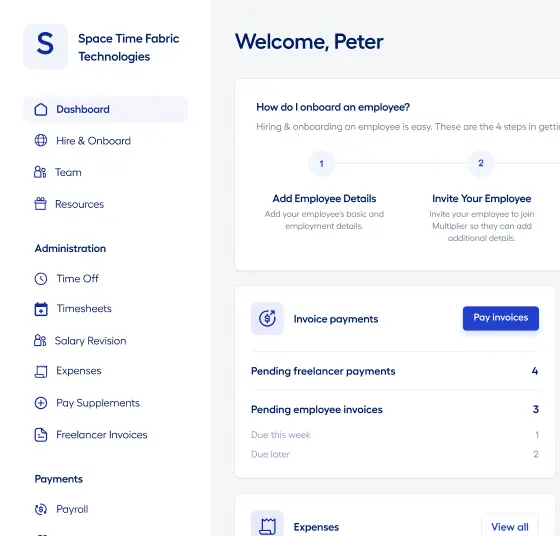Any well-entrenched business will have a pay philosophy. A compensation bible. A philosophy that amalgamates company values and compensation benchmarks to guide HR and finance leaders to plan salary budgets and offer packages.
As companies hire globally, designing a global pay philosophy helps plan salary budgets for different talent markets. It also helps maintain pay equity across socio-economic contexts.
So, how to plan global pay philosophies? How to ensure pay equity? We attended the Transform HR event in Vegas, where some insightful conversations happened around these topics. We’ve borrowed hiring and compensation tips from the event.
Planning a Global Compensation Philosophy
With companies increasingly focusing on hiring cross-border talent, equitably paying employees becomes central to offering good employee experiences.
Here are six things you must factor in when planning a compensation philosophy.
1. Pay equity can help you retain talent
Your pay philosophy must be inclusive and cut through location, race, and gender biases. Ensuring employees receive comparable compensation to their colleagues for performing the same or similar work can make it easier to defend philosophies and promote employee satisfaction. Aptitude Research Partners found that organizations prioritizing pay equity see, on average, 13% higher engagement levels, are 19% more likely to exceed average industry productivity levels, and see better than industry average turnover benchmarks (54%).
Jen Paxton, Co-founder of Jamyr, who was speaking on this topic, also echoed this research’s findings. When planning the pay philosophy for Jamyr, she observed that people were willing to forfeit pay bumps if the company ensured pay equity.
“If we went the value-based route, this probably means that you’re (employee) not getting as big of a pay bump. Are you okay with that? And people said yes. They wanted to be more in line with their peers and be willing to take less money, knowing they would be in line with the same contribution”.
2. Consider the cost of scale
A well-thought-out global pay philosophy ensures that employees’ salaries are sustainable while remaining competitive. Speaking at the conference, Jen Paxton, Co-founder of Jamyr, says that employers must plan for scalability when drawing a pay philosophy.
First, she recommends employers plan for future headcount. As the company expands, pay philosophies must guide how much the firm will pay when hiring in different countries. Which country’s percentile will be the benchmark? Will salary hikes be solely performance-based or adhere to location factors and inflation rates too?
She also recommends employers consider their current employee count as well. By planning for the current headcount, employers, guided by the new pay philosophy, can plan sustainable salary revisions.
To plan for scale, Jen’s organization took the value-based route to compensation. Value-based compensation ensures you pay employees with similar job roles the same salary, regardless of location and lifestyle costs. A salary.com study reveals that 94% of employees think skill set — not geography — should determine their salaries. A value-based compensation helps retain talent most logically. Negotiating salaries is easier too. Employers can use a common denominator like skill set and experience. This makes salary negotiations more transparent and fair.
3. You could also consider location-based pay
Another area your global compensation philosophy should address is location-based pay. The talk on pay equity has taken a whole new meaning after remote work. Calculating location-based compensation requires companies to develop formulas to factor in local expenses, market rates, employee skills, and experience. Such a compensation strategy allows you to hire from low-cost economies, decreasing stress on your hiring budgets. However, this may also lead to resentment among employees who receive lower salaries because they are from a low-cost market. Research suggests that employees in the same roles observe location-based pay differences from 3% for entry-level associates to 90% for software engineering roles.
According to the speakers in Transform HR, it is best to fix a geographic percentile and pay your workforce accordingly. Your pay philosophy should guide HR leaders to compensate and budget salaries by allowing them to pay above a certain percentile. This allows leaders to negotiate salaries based on location and remain competitive in the talent market.
4. Always tie pay strategies to company culture
Assess company culture and core values people espouse to plan your pay philosophy. It is best to let your company culture guide your pay philosophy. This makes life easier for managers, who must communicate any changes or a revamp to the pay philosophy. It also helps them answer tricky questions concerning pay equality.
5. Create a space for voicing compensation concerns
When measuring compensation sentiments, employee surveys are a no-brainer. Conduct surveys and interviews for employees to voice out concerns around compensation. Encourage questions. “Why does the company have a compensation philosophy set up the way it is?” “And am I being paid fairly?”
Ensure that your employees are empowered to ask these tough questions. Empower your managers to answer these concerns.
This tactic helps you gauge employee expectations are changing and how employers can fulfill them. They can help you reduce salary costs and compensate employees differently. For example, recession fears can make you financially conservative. In such times, surveys help understand if you can tailor compensation differently. In place of salary bonuses and hikes, you could offer health-related benefits, ESOPs, wellness programs, career development resources, time off, etc.
6. Clearly communicate currency standards
Paxton also explained that one of her biggest lessons was setting expectations around currency standards. She recounted how failing to explain how your employees will get paid will lead to chaos.
“I had already decided with finance (the team) what exchange we would use. Everything was budgeted in Canadian dollars. And so the very first time that I gave managers their salary, and their direct reports, new salaries, it was all Canadian dollars -no matter where they were located. Because I was like, oh, they’ll figure it out. No, they’re not going to figure that out.”
Communicating change is as crucial as planning them. Your employees are away from you during planning. It is essential to think two to threefold when communicating changes in compensation.
A pay philosophy that empathizes with your distributed employees can ensure a better employee experience. Many parts of the world are encountering tight talent markets. Formulating a data-informed pay philosophy can ensure you remain competitive in the talent market.







